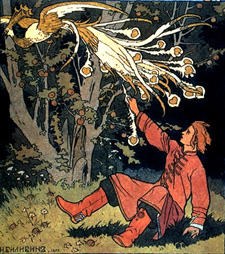Ever since I was a teenager I've bought used books. I like them clean, not marked up, but I also enjoy, somehow, knowing that this paper has been touched by other hands and these words have flowed into other minds. If the book has an interesting signature on the flyleaf, a "discarded" stamp from some rural library, or an odd bookplate, so much the better.
When I was younger, I'd buy them at the local thrift shop, so they mostly were from close to home. Most were old novels or story collections -- I got my Dumas, Scott, Poe, Hawthorne that way. But with time my interests have grown more arcane, and with Internet resources like Alibris and Powells, I buy a book now because usually it's the only copy available, and I get it from wherever it comes from.
I've bought several older, thorough, obscure language dictionaries in the last 10 years or so. Not the kind of thing most people would want to load down on their shelves: Thick blocks of book, mostly in German, published in the early 20th century. Really fine books, if you enjoy a well-made book.
Their provenance, where they've been before they arrived in my hands, began to interest me the other night when I was looking something up in a German-language dictionary of French etymology printed at the university press in Heidelberg in the 1920s. The bookplate was a pen-and-ink sketch of an idyllic tropical scene, with dark-skinned people diving in calm waters beside a hut and under a palm tree. And the name was like something from Waugh: Peter Antony Lanyon-Orgill. It occurred to me that the Internet which brought me this book might tell me who he was.
I looked over my shelf for other names to research, and realized I had two of his books -- the massive Oxford Sanskrit-English dictionary (by the delightfully named Monier Monier-Williams) also has his nameplate on it.
As I suspected, he wasn't hard to find. To my delight, he was a sort of brilliant, bold, and controversial Cornwall character, characterized as a "fringe" figure in some quarters, cited as an authority in others.
Peter A. Lanyon-Orgill (1924-2002) made himself a place in every bibliography of Pacific linguistics without, it could be argued, ever making any original contribution to the field. At one extreme his publishing activities verged on fraud and plagiarism, but from another point of view he made available work which otherwise might have languished unknown in manuscript form. Throughout it all, in parallel with his real life as a schoolmaster, he constructed an apparently imaginary scholarly career, complete with field research, advanced degrees, and learned colleagues, all largely of his own invention.
His ancestor had sailed with Captain Cook, but his own writings elicit dire warning in scholarly books about the mysterious Easter Island writing systems.
Apparently his library was broken up and sold when he died, which is how I came to own a little part of it, which I cherish more today than I did yesterday.
Before I bought that Sanskrit-English dictionary, I bought a small Sanskrit-English dictionary online from Powells.com. When I got it, I realized it was going to be useless to me, because all the Indic words are in the Devanagari script, which I do not read sufficiently to transliterate. It looks to be an older book, possibly 19th century, originally published in India and reprinted in the 1990s in England.
Still, I find myself sitting up at night, thumbing through it, scanning the columns of strange script and familiar definitions. A dictionary half in an unknown language is a fountain of inspiration. Delightful connections are expressed there, along with conceptions that convince me that, in ancient India, the world had a civilization that has hardly been matched in subtlety and sophistication.
- A man who does not cook for himself; a bad cook [a term of abuse].
- A mouse; a miser.
- Licked; surrounded.
- m. A bee; a scorpion. f. A woman's female friend.
- A whirlpool, a crowded place.
- Inaccessible; unfit for sexual intercourse; difficult to understand.
There are whole sermons and life lessons in a single word:
- Repentance, intense enmity, close attachment.
- Fire; appetite; gold.
- A great danger; a desperate act.
- Supported; haughty; near; obstructed.
- Touched; violated; judged; endured.
- Relaxation; independence.
There are mysteries fit to be taken whole as a poem by Wallace Stevens or William Carlos Williams, or to inspire a Borges ficción:
- A benediction; a serpent's fang.
- Homeless, imperishable.
- Ungovernable; necessary.
- Painting figures on the body; feathering an arrow.
I meet words I wish I had; that is, words for which there is no single word in English that covers the same territory. Every language has such words. One of my linguistics books lists some examples of this from the Sye language of Micronesia: livinlivin - the top of something that is teetering over an edge and about to fall; orvalei - to complain, unjustly, that something is insufficient or not enough. Among the words in the Sanskrit dictionary I wish we had in English were ones meaning:
- Pleasure arising from sympathy.
- One who has suppressed his tears.
- An illustration of a thing by its reverse.
- A practice not usually proper to the caste but allowable in time of distress.
- A figure of speech dependent on sense and not on sound.

